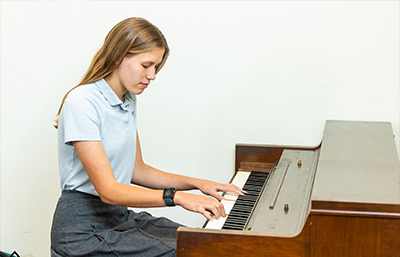 Cultivating truth, goodness, and beauty grounded in the Christian worldview
Cultivating truth, goodness, and beauty grounded in the Christian worldview Cultivating truth, goodness, and beauty grounded in the Christian worldview
Cultivating truth, goodness, and beauty grounded in the Christian worldview
The scope and sequence to Stonehaven's curriculum follows a distinct classical Christian model. The primary goals to this curriculum design include integration of disciplines, a liberal arts focus, and alignment with the developmental phases of the Trivium. The Upper School Curriculum seeks to engage the student's capacity for logical thinking and persuasive communication.
Logic phase students (7th-9th grades) engage with both formal and informal logic moving towards analysis of long-form argumentation so they may practice careful listening and reading, sound reasoning, precise communication, and confident yet humble dialectic.
10th-12th grade students study rhetoric. Rhetoric is the ability to see what is persuasive in every given case, according to Aristotle who also noted that it can be used by virtuous people as well as the depraved. Stonehaven's Upper School strongly desires graduates to use rhetoric to demonstrate and defend truth, goodness, and beauty while using learned tools to analyze the persuasive efforts of others.
Students study the past to better understand the people, forces, and events that shaped the world as they know it. Relying heavily on primary sources, students develop their historical thinking by making historical connections, evaluating continuity and change over time, and considering the context and complexity of historical events.
Through the study of great books, students evaluate character through the lens of virtue, learn to identify and analyze the major themes of a literary work, and consider expressions of truth, goodness, and beauty in the written word. In addition to reviewing fundamentals of grammar and composition, students hone their ability to write and argue persuasively through essays and socratic discussion.
Within Stonehaven’s science program, we seek to draw students into close engagement with the subject matter and provide a solid education while fostering a sense of wonder and responsibility for God’s amazing creation. Learning through laboratories is an integral part of the science program. Not only does a lab practicum give students direct knowledge and experience that are virtually impossible to obtain from a text, but the report writing component of the lab work provides a rich enhancement to the primary objectives for the course.
In studying mathematics, Stonehaven challenges students to discover creative methods of problem solving, to think logically and orderly, and to work carefully all while developing a deeper appreciation for the beauty and order of God's creation.
The goal of Stonehaven's Bible program is rooted in discipleship - teaching Biblical truth in the context of a trusted relationship. It is because of this aim that we have gender-specific Bible classes for logic phase students. Our Bible teachers invest in knowing our students well so that Biblical knowledge can be applied to the heart. In the Rhetoric phase, the focus is training our students to communicate the gospel in meaningful ways to our culture. Through studies in Biblical Worldview, ethics, church history, and redemptive Biblical themes, students learn to answer the questions: "Who is God" and "What does He mean to me" in profoundly personal and impactful ways.
Stonehaven uses the pedagogical approach of Comprehensible Input in both Latin and Spanish Language instruction. Language is not built up from grammar practice, but from consistent and constant exposure to input. Input is indispensable to language acquisition. An input-rich class is an equitable class, where all students can succeed.
Because Stonehaven is committed to preparing our students for all aspects of life, we offer a wide selection of practica which include training in life skills and the arts. Examples of manual arts practica include baking, farm & garden, and woodworking. Examples of fine arts practica include painting, drama, and choir.
"Eustace had read only the wrong books. They had a lot to say about exports and imports and governments and drains, but they were weak on dragons." - C.S. Lewis (Voyage of the Dawn Treader)

